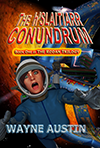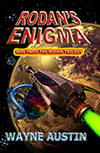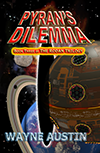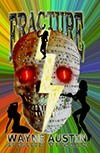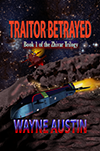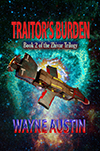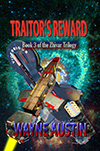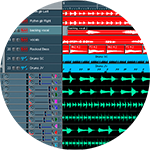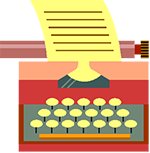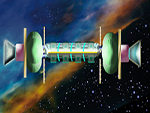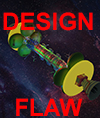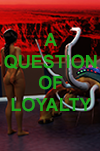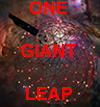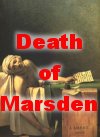
Death of Pretension
By Wayne Austin
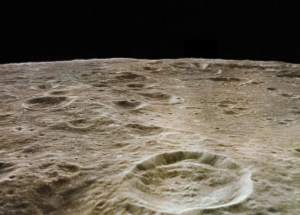
For twenty thousand years, I have played this role. But no more!
Jarold Morgen, old beyond years and stooped, with rounded shoulders and gray wisps that punctuated his mottled, bald head, wheeled away from the body lying before him to confront his audience. They watched, spellbound. Even now, he could draw them in. No one coughed or murmured or shuffled, restless. All leant forward in their seats, eyes fixed on him, staring, waiting, while countless millions watched on holoscreens around the solar system. His eyes narrowed as the timer counted down in the peripheral vision of his right eye.
I am nothing but a robot. Can’t they see that? Fools! We are all robots ... trapped. I have no choice.
Jarold threw out his arms to appeal to the audience. “And so it comes to this,” he intoned. “After all this time, I worship her still ... though she betrayed me.” He dropped his head to rest his chin on his chest, knowing they hung on his every word. “I could bring her back.” He offered up a small vial filled with an orange liquid. “Such is my pretension. One spray and she will wake to answer for her crimes.” He sighed and looked up once more. “So many bay for vengeance,” he clamped his eyes shut and grimaced, “but revenge is more bitter than sweet. I know. I loved her in life. Now—”
The counter reached zero and Jarold sprayed the contents of the vial in a sprawling arc toward the audience. There! It is done.
“And now,” he whispered, “I will love her more in death.”
The lights dimmed and the curtain fell. For a moment there was silence and then applause burst forth, rising louder and louder. The rest of the cast assembled in a line, but Jarold hurried from the stage. He had announced that he would give no curtain calls on this, his ten-thousandth performance of his famous play, Death of Pretension, and he meant to keep that promise. There was only one reason he had come back, after a century, to perform it again.
In his room, he picked up the dermal wand, switched it on and waved it around his head, all the while trying to ignore the pull of the incessant applause that rippled backstage and lingered at his door. His skin tingled for a moment and then the layer of ages loosened. Jarold put down the wand and peeled away his makeup.
The applause turned into a demanding clap, clap, clap that overlaid a muffled chant, “Jarold, Jarold, Jarold.” Still he resisted the call of the sirens. How long will it be before they bay for my blood?
He turned the mask of once living flesh over to stare at the ancient face, all wrinkled and blotched. Was this how people really looked when once they aged? Back in the ancient past, back when time took it’s toll and evolution ruled supreme? Back when humanity had a choice, had free will?
Jarold stared at his face in the mirror. For twenty millennia, he hadn’t changed, apart from cosmetic fancies. But how many hairstyles were there? How many eye-colors, and skin-colors? How many possible combinations, how many different fashions? His young face had paraded them all, many, many times. Too many times. There was nothing to look forward to. The human race was stagnant — had been for tens of centuries. No new art, no new science, no new dreams, just a rehash of old, old ideas, like Death of Pretension.
At last, the clapping faltered and fell apart. Just like the false promise immortality had made to the human race.
A smirk crossed Jarold’s face. “It’s time to break free of our gilded cage and rejoin evolution, my fellow Homo sapiens. One day, our descendents will thank me. Mark my words!”
With that, he sprung out of his chair, invigorated by the thought of what was about to happen, tore off his clothes and leapt into the sonic shower. The spray washed away the remnants of his makeup and the sweat of his performance, leaving him feeling born anew. This performance of Death of Pretension was his last. One day, he would perform a new play, written by a playwright belonging to Homo superior, and it would have new insights into the human condition that no Homo sapiens was capable of. Then, and only then, would he join his fellow Homo sapiens and consign himself to history.
But for the moment, he had to get to Nadia.
The sooner they disappeared, the better. When the news was released of what the Evolution Society had done there would be pandemonium and cries of revenge. Nadia had said it could take years before the rest of society calmed down enough to see that this was in humanity’s best interests, but when the children came along — and not the recycled genes in mere clones — everything would change. It was obvious, wasn’t it?
“It is every species duty to evolve into something higher,” Jarold muttered the Evolution Society’s mantra under his breath and dashed out for the back exit ... and ploughed into a crowd of fans determined to get an autograph from the great man.
“No ... no.” He tried to wave them away with a weary smile, but stopped to sign a few. “Please, I’m in a hurry.” At last, with an apologetic smile, he broke free and managed a few steps.
“Jarold Morgen! Stop!”
He pulled up, wheeled round and froze. The crowd had parted like the Red Sea and a tall black man, resplendent in the gold uniform of a senior officer in System Security, stared at him with a stern face. Jarold swallowed and his hands trembled even as he squeezed them into fists to mask his fear. How did they find out?
“Ye-yes?” He spoke in a small voice, weak and pathetic and not at all the voice of a great man involved in changing humanity’s destiny.
The black man strode over. Then his face broke into an ebullient smile and he put his arm around Jarold’s shoulders. “I’m Alvor Komar.” He squeezed Jarold to him. “I’m your biggest fan.”
“Re-really?” Jarold’s shoulders sagged as he realized he hadn’t blown it and surrendered to Komar’s hug.
“I love all your work, but Death of Pretension,” he sucked in a succinct breath to revel in his point, “nothing comes close! D’you know? I’ve been to all your thousandth performances and this is by far the best. The emotional tension you generate ... unbelievable!”
“I’m gratified it moves you so.” Jarold shifted to ease free, but Komar tightened his grip.
“And I promised myself a photo op with you.”
“But—”
“Even if I have to arrest you.”
Jarold gulped as his fans gathered round, trapping him.
“I’m only joking.” Komar boomed out a hearty laugh. “I’ve never arrested anyone. Not ever! And I’ve been in this job for two thousand years.” Then he winked. “But there’s always a first time — oh come on! I know what you told the press but this will only take a second.” He squeezed Jarold’s shoulders again.
Jarold sucked in a breath. Fans ... they were an accursed elixir. “Certainly, why not.”
“Great!” Komar whipped out a blank sheet from inside his coat and held it out at arm’s length before letting go. The sheet hovered and moved back a fraction.
“Smile!” it said.
Komar squeezed him again and Jarold managed a thin smile. A pictured popped onto the sheet with a cringing Jarold crushed against a Komar grinning like he was having the most delectable orgasm. Komar fumbled inside his coat and pulled out a pen, before grabbing the sheet.
“Please? Sign it for me.” He proffered the pen.
With a resigned flourish, Jarold scribbled a short message and handed the pen and picture back.
“Oh thank you! I will treasure this always.”
Then the crowd pressed in and it took another hour before he could break away.
Jarold sucked in a breath and let it ease out. Stay calm. Look calm. Inside, his guts had turned to jelly, but he kept up his calm facade for the time it took to cover the remaining few meters to his apartment. None of his roles had ever been as demanding as this.
The door slid shut behind him and he slumped back against it. Oh what sweet relief.
There was no stopping the inevitable now, but how many times had he almost let slip what was about to happen? All those interviews and public appearances in the last few months, leading up to his final performance? But he was free at last. No need for any more pretense. He grimaced at the tension still in his shoulders.
Nadia ambled into the hallway, radiant as always, her lips pursed in concentration, and the string of suitcases following behind settled into a neat formation as she stopped and looked up. Her brow furrowed as she saw the state he was in and she rushed up to him. “Are you all right? You’re trembling!”
Jarold pulled her into a bear hug and rested his cheek on top of her head as he savored her strength. She was the glue that held him together, the rock that dashed his fears. “Oh, it was a nightmare! That was my worst performance ever. For a moment I had a mental blackout. I nearly panicked.”
“I should have been there—”
“No! If anything went wrong....” Jarold shook his head, rubbing his cheek against her silky, auburn hair, and chuckled as the tension drained out of him. “A SysSec stopped me just as I was about to get away. I nearly died. Almost pissed myself. But he only wanted an autographed photo!” Nadia joined in as his chuckle turned to a throaty laugh.
Then Jarold held her back at arm’s length and searched her face for any sign of problems. “Is it done? I sprayed the trigger right on time.”
“You needn’t have, besides ... it was risky. What if someone scanned your vial and discovered it contained more than colored water?”
“I needed to do something symbolic — to be involved. I don’t want to be just a figurehead.”
Nadia gripped his arms and squeezed. “But you are important. Once the initial pandemonium dies down, you can go public and convince them of our cause. People will listen to you.”
Jarold relaxed back against the door and pulled Nadia to him, luxuriating in her warmth as he stared into the distance. “Fifteen hundred years! I can’t believe how many times I thought we’d never succeed.” He kissed the top of her head. “I’m so proud of you and all the others. At last, humanity can begin evolving again.”
She pulled back and stared up at him, her eyes glistening with true belief, and together they intoned their mantra, “It is every species duty to evolve into something higher.”
Jarold looked up at the ceiling and let out a joyous laugh. “And with our guidance ... I can barely imagine what humanity will become.”
With that sobering reminder that time was of the essence, he eased past and grabbed her hand to lead her after him. “Come. Have you finished packing? We have to leave. Now.”
Nadia held back, a coy smile on her face. “Why, what’s the rush? There won’t be any signs for a few days.”
“I know, but—” He arched his eyebrows as her smile deepened. “What are you grinning about?”
She dragged him into a passionate kiss before relenting. “I took the trigger four weeks ago. Someone has to have the first real baby and I want it to be me. Jarold!” She ruffled his hair and jiggled on the spot, grinning with tears in her eyes. “I’m ovulating! Right now! We can leave later, but right now ... there’s no time to waste!” This time, she tugged on his arm and hauled him after her.
“But ... but what about me? It’ll take days before—”
“I gave you the trigger as well. You should be producing plenty of sperm by now. So, come on!” With a sultry laugh, she dragged him past the pile of suitcases, still waiting for directions.
The information channels were full of the mysterious epidemic that had broken out all over the solar system. Around the world and in the cities on Mars and Luna, in the space stations around Jupiter and Saturn, even out at the edge of the Oort Cloud — wherever there were people — came reports of a mild illness, a slight fever and headaches, pain in the joints. The first illness in living memory, or so it seemed, and no one was immune. The medics, used to dealing with injuries rather than illness, had nothing in their databases that could help.
Jarold snorted a laugh and lay back on the bed, scanning the channels while Nadia nestled up against him. Once more, she ran a scanner over her belly and giggled.
“Nadia!” He grabbed the scanner from her grasp and tossed it aside. “You can’t actually see him getting bigger.” He twisted to kiss her cheek and then rubbed her belly. “Incredible! He’s so small. If I didn’t know any better, I’d swear you weren’t pregnant.”
She smiled and rolled to press against him. Her fingernail teased his left nipple, drawing small circles around its areola. “Do you want to make certain?” she whispered. “It’s been a couple of days.”
Jarold grabbed her hand as it slid down over his stomach. “Sorry, darling, maybe later. I’ve got a slight headache.”
As a joke, she reached up to touch his forehead and then her brow furrowed. “You’ve got a temperature. Strange. We’re not reversing our immortality, only our fertility.”
Jarold hesitated and bit his lip. For all his bravado, one thought had kept him awake some nights, gnawing at him, with only Nadia’s quiet breathing to calm him. But now....
“Maybe Kantaro made a mistake. I mean, this is all untried—”
“Jarold!” Nadia sat up and leant over him, her face stern to drive away his uncertainty. “Kantaro and her team spent six hundred years researching how to reverse the immortality processes, and how to protect us. All their simulations — every single result proved it will work.”
“Yes, but what about—?”
“She said there might be a few side effects, but they would be nothing to worry about. Look at me. I haven’t had any problems. And I am pregnant.” She brushed the hair from his brow and cupped his cheek. “Lose your doubts,” she murmured. “I swear, nothing will go wrong.”
Jarold lifted up a hand to argue, then shrugged and stroked her arm instead, more to draw strength from her resolve. “If you say so.” He knew it was wrong to be so weak, now, when he needed to be strong, but the bad feeling refused to fade away. “Still ... what if we just check with some of the others—?”
“And give ourselves away? Not with the Society’s announcement next week.” Nadia lay down and clung to him, her head resting on his chest. “Why don’t we think up a name for our son?” she suggested.
“Yeah, why not?” Jarold mumbled. He stared up at the ceiling and pondered the future. Not knowing was hardest to take. This had never been tried, and as good as Kantaro and her team were, simulations, no matter how accurate, still couldn’t model reality one hundred percent. What if they missed one tiny little thing? Oh why had he started this in the first place? Except they had no choice, he knew that to the core of his being. Still, it was pure madness—
“We can have thousands of children.” A contented chuckle escaped Nadia’s lips and she stretched against him. “Thousands. I wonder if there are enough names to go round.”
The weeks dragged, cooped up as they were, but Nadia’s belly grew bigger. She radiated good health and even Jarold’s symptoms faded away, taking his doubts with them. After the Evolution Society’s announcement, there was nothing to do, but watch the mayhem unfold across the solar system.
Jarold surfed the news channels, his face grim. Everywhere, mobs rampaged, venting their frustration against lines of bronze figures that wavered against the onslaught, breaking in some places and falling back to regroup in others. Most of the time they milled around at the edges as if uncertain of what to do and impotent to act. Jarold shook his head and frowned. So much for System Security. Still, the sheer vehemence of the public’s reaction took his breath away.
“Vengeance is thine,” he mumbled.
“What was that?”
Jarold looked across at Nadia, ensconced in a reclining chair in the corner of the bedroom. Her hands cupped her small potbelly as if she were covering the baby’s eyes and ears so that it couldn’t see or hear the terrible results perpetrated in its name.
“Oh ... I was just muttering to myself. I never thought—”
Nadia’s eyes flicked to the holoscreen and went wide. “Look!” she gasped in a trembling voice and then pointed at the screen as she covered her mouth with her other hand.
Jarold turned to stare at the scene on display and frowned as he tried to make sense of what he was seeing. A squad of bronze uniforms had burst through a crowd surrounding the building. They dragged a man and a pregnant woman with them.
Nadia stiffened. “That’s Indera! And Markan.”
The screen split to show the Commissioner of Security, a black man in a gold uniform, his tired eyes buried in a haggard face.
Jarold sat up and leant forward. “I know him!”
“My fellow citizens,” Alvor Komar squared his shoulders, “this is the first in a wave of arrests. Even as I speak, further arrests are being carried out in a coordinated action across the solar system. We will round up every last member of this...” he grimaced as if searching for the right word, a long lost word, alien and unreal, “this terrorist organization. They will pay! And I swear, we will recover the missing medical information we need to reverse what they have done—”
He glanced to the side and his eyes went wide with dismay. In the other half of the screen, the crowd surged around the squad and tore Indera and Markan free.
“No!” Komar held up a futile hand, but Indera and Markan disappeared, sucked down in an angry sea to drown as wave after wave of fists and boots crashed down on them.
“Indera!” Nadia sagged back into her chair and a high-pitched moan escaped her lips.
“Don’t look,” Jarold whispered, but as much as he wanted to, he couldn’t tear his gaze away either. After a moment, the two bodies surfaced, bleeding and broken, limp flotsam that was carried away on a current of pure hate. Over the crowd’s baying, Nadia’s sobs stabbed at his heart. He clutched at his stomach, wanting to be sick, wanting to offer up his own bitter bile as poor compensation for the two lives he could not bring back, but all he could offer was silent despair.
“I urge you,” Komar cried out in a desperate whine, “don’t take the law into your hands. Work with us! We need them alive.”
Jarold closed his eyes, wishing he would cry so his tears could wash away the pain. “Too late,” he mumbled to Komar. With Nadia’s best friend dead, there was no hope of going back.
He looked across at Nadia, still sobbing, with her knees pulled to her chest, and scrambled off the bed to comfort her in his arms. They could make a run for it. But where would they go? He was famous. What a curse. His face would be a magnet for death. And even makeup wouldn’t stop him being identified. No, it was better to wait for the breaking in of the door and the stomp of jackboots. At least they had chosen their hideaway well in the remote Andes; they might just survive the small crowd that could assemble.
On the holoscreen, news came in of more arrests.
The hunt began to wear. Jarold followed the trail of the baying hounds on the news channels, unable to break free of its song. Nadia too, was hooked. Day after day, she lay with her head on his lap, sharing his rollercoaster ride as the trail swerved toward them, then slithered past and danced away.
At least the public anger had faded to a simmering undercurrent of tension. The hatred was still there, but it no longer took its toll on those arrested. And even though over five thousand members were incarcerated in apartment buildings and hotels converted into prisons — a quaint term from antiquity — the future now held a glimmer of hope.
Nadia rolled over onto her back and winced. “Can you get me some water?”
“Certainly, my love.” Jarold smiled at her, but his smile faded to a concerned frown as he stroked her forehead. Her hair was damp and her brow warm. “You’re sweating.” Strange, the room wasn’t hot. “Is that normal for pregnancy? Like the vomiting?” He eased out from under her head and stood up.
Nadia wiped her brow with the back of her hand and then massaged her eyes. “I don’t know.” She sighed and shivered, hugging herself. “Is it cold in here?” She groaned and looked up at Jarold. “Please. The water.”
“Coming up.” Jarold ducked into the small kitchen, but before he could grab a cup, there was a thump and Nadia cried out, more of a strangled scream. He rushed back in and froze, the shock scattering his thoughts.
She lay on the floor in a fetal position beside the bed, whimpering, her face scrunched up in pain and her hands shoved between her thighs. He knelt down and reached out a hesitant hand, stopping short of touching her.
“Na-Nadia, what’s wrong?”
“I—” She snatched at his hand to pull him close and he stared in disbelief at the slimy redness coating her fingers. “I think I’m having the baby.” She squealed through a grimace and let go to jab her hand back between her thighs as if to hold it in.
“No ... no, you can’t be!” Jarold hesitated and then tried to sit Nadia up, to comfort her, to do something. “There’s still four months to go.”
“Please!” She gripped his arm and sunk her nails in. Her breath came in short stabs through gritted teeth and her eyes implored him. She screamed again. “It’s coming!”
Jarold tore her bloodied hand from him and staggered to his feet. “All right. Hang ... hang on.” But his feet were rooted to the spot. Her pants were wet and stained a bright red like she had just had a bloody enema.
She screamed and gagged on it. “Hurry!”
With that, Jarold tore free and raced for the bathroom.
“Medic!” he screamed at the medical unit in the wall. “What do I do?”
“Calm down,” said the unit. “Your blood pressure is elevated—”
“No! Nadia’s having the baby and it’s too early. What do I do?”
“I do not have information on human pregnancies.”
Jarold slapped the unit in frustration. “Why not?”
“All references point to nonexistent data. You will have to consult—”
“I need to do something now.”
A slot opened in the medic’s panel and a cylindrical handle extended out. “Please scan over Nadia’s injury with this. I will make a diagnosis and suggest treatment.”
Jarold yanked out the scanner and raced into the bedroom. Nadia was pale, like she had just applied makeup for her death scene and was ready to go on.
“No!” He dropped to her side and his hand trembled so much that he waved the scanner over her belly in frantic, jerky movements.
“I cannot treat this,” said the medic through the scanner. “I have contacted a specialist medic and an ambulance has been dispatched. It will arrive in ten minutes.”
“No!” Jarold cried out, but he knew it was too late. He pulled Nadia to him and felt her body quiver as she moaned again. No doubt, System Security had been advised. The bronze uniforms arrived in eight.
Jarold wondered why he had been taken from his solitary confinement to such a stark room in this remote hacienda. Was this to be his new prison? Its dark-red wooden floor contrasted against where a shaft of brilliance shone through the large window and painted the austere white walls in morning sunlight. He strained against the straps that bound his arms to the armrests of the hard chair in the center of the room. Why had they restrained him in this way? He wasn’t a threat to anyone.
The door slid open. Alvor Komar strode in and stopped to stare at Jarold as the door slid shut. For a long moment, he said nothing, his eyes narrowed, and only his lips, flinching a touch now and then, betrayed the emotions boiling below the surface.
“So,” Jarold swallowed, “we meet again. I take it you don’t want another autograph.”
Komar blinked and peered at Jarold, bemused, then a sour smile crossed his face. He reached into his jacket and plucked out a photo, holding it up by the corner for Jarold to see. “Remember this? We had it taken when I was your biggest fan.” He flicked his wrist and the photo dissolved into a cloud of dust motes, glinting in the sunlight as they dispersed. “Was.” Komar turned away to stare out the window.
With a slight shrug, Jarold dismissed the insult. The past was just that. It was the future that counted.
He licked his lips and sucked in a breath. “How ... how is Nadia—?”
Komar whirled round, his face masked in fury. “Do you know what your stupid Evolution Society has done?” He clenched his fists by his side so hard he trembled. “What gall! How dare you? What gives all of you the right to decide humanity’s destiny? Huh? What right?” He took two steps forward until he towered over Jarold, fists pulled up like he wanted to strike, to lash out and vent all his rage on his helpless victim.
Then, with a loud exhale, the fury seeped from Komar’s face until all that was left was an impassive mask. He turned away to stare out the window again, hands clasped behind his back.
With a scowl, Jarold kept his silence even though there was so much he needed to know. He hadn’t expected to be a martyr, but if that was to be the role history consigned him to, then so be it, he would play it to perfection. Let the future judge him, not these shortsighted fools.
“The council, convened to consider this crime, has pronounced its sentence,” Komar said at last in an even voice. “All remaining members of the Evolution Society are to be kept in solitary confinement for the rest of their lives.”
Jarold frowned at this unexpected news. “What? No trial? I have a state—”
“There is no need. We have confessions willingly given. Indeed...” there was a hint of a sneer in Komar’s voice, “they all wanted to convince us of the worthiness of their cause.” Komar shook his head and his shoulders sagged. “Until they learnt the truth,” he finished in a soft voice, filled with sadness.
“But I want to make a statement. I know I can—”
“No one wants to know.” Komar spun round, anger flaring in his eyes as he implored Jarold. “Don’t you see? Your actions will cause the deaths of eleven billion people and there is nothing ... nothing we can do about it. We only have fifty or sixty years left at the most. Why did you have to erase all information?
“This Indera. She led a team— Why? Why did she have to erase every single record? Every document and reference in every database, library or archive. In every robot or intelligent system. Right across the whole solar system. Why?” Komar let out a sad laugh as he held a despairing palm up to the heavens to let Jarold know what he thought of Indera’s obsessiveness. “Including the most insignificant of items that could even remotely be used to make us immortal again.”
“But she made an archive.”
“We have it, but it’s multiply-encrypted and our best estimates are that it will take a thousand years or so to break it. Do you have the keys by any chance?”
Jarold shook his head and looked away. Indera and Markan had kept the keys to themselves so that no one could compromise any chance those future generations had to fulfill their destiny.
“I thought not. What a secretive lot you are. And to think ... it’s rather ironic, isn’t it? The very people who could save us were the first to die.”
Jarold stared up at Komar with a fierce conviction. “But that’s the wrong way to look at it. You will live on ... in your children. They are your future. And they will have the free will to achieve a greatness denied us by our very immortality. You can’t imprison us forever. One day, those new generations will see that we are right, see the wisdom in our beliefs, and free us. All species must evolve. It’s a law of nature.”
“Children?” Komar barked a laugh and turned a way. “What children? Your Society purged the clone banks — all of them! And the knowledge to create more clones was also wiped.” Komar’s shoulders sagged a touch. “There will be no replacements for us, no children.”
“What are you talking about? We can have children the natural way — the way we were meant to have them. In a month or so, Nadia....” His voice faltered and lost its confidence. “You will see. When she has our child—”
“She won’t.” Komar held his arms out before him and rested against the window, like the weight of the world had suddenly descended upon him. His head dropped and he looked a very sad, a very weary figure. “It died.”
“What?” Jarold said in a very soft, faint voice, like the wind had been knocked out of him. His skin crawled.
“Nadia too,” added Komar, his voice so low that for a moment, Jarold almost believed he hadn’t heard right.
“But ... but how? She was all right before. The medics stopped the bleeding and saved the baby.”
Komar sucked in a breath and straightened up. “Only for a while, but the fetus aborted and she hemorrhaged so much that she died in minutes. There was nothing the medics could do.”
Tears welled up in Jarold’s eyes. “I don’t ... don’t believe it.” Komar had to be lying to him. That was it. A cruel trick to punish him. Nadia was alive and well and they had probably told her that Jarold was dead so that she could suffer as well.
“And all the other women in the Evolution Society. The last one has just died.”
“No!” Jarold snapped out of his reverie. “That’s impossible. Kantaro modeled every possibility....” His voice faded to a whisper. All those sleepless nights, he should have said no, he should have said they must wait a few more centuries or try it out on just a few to make sure everything worked. But no. Kantaro was so sure of herself, and Nadia and the others were so insistent, he had given in. He should have said no. His strength, his bravado deserted him and left him an empty shell leaking tears to the ragged beat of his sobbing.
“Indeed she did. Our analysis of her results show that her team was very thorough. All the steps to reverse our immortality worked and all the steps to allow us to have children worked. But—” Komar turned round and shrugged. “She could only model a full pregnancy based on cloning data and that’s not the same. So, to make certain that the fetuses had the best chance to develop, she left in the enhancements to our immune systems in the ova and sperm. But all the fetuses ... when they reached a certain size, their immune systems attacked their mothers and caused them to hemorrhage. The babies killed their own mothers.”
Komar rubbed his brow and grimaced. “All babies will. And there is nothing we can do to stop it.”
Jarold dropped his head back. “No!” he screamed in a primal howl.
“So.” Komar stepped up beside Jarold and looked down at him, his eyes cold and unforgiving. “Except for the men in the Evolution Society, everyone is doomed to die. You should be happy.”
What a cruel thing to say. Jarold frowned as he peered up at Komar. “Why?”
“You’ve succeeded at what you set out to do.”
“I don’t understand. What are you talking about?”
A sad smile played over Komar’s face. “You wanted the human race to rejoin evolution. Well, you’ve done that.”
“What do you mean?”
“Do you know what the fate of most species is?”
“They evolve—”
“No. They go extinct.” Komar turned toward the door. “So you see? You’ve succeeded beyond your wildest expectations.”
Jarold wriggled in his chair, trying to face Komar. “That isn’t what was supposed to happen—”
The door slid open and Nadia stepped in, followed by another Alvor Komar.
“Nadia!” No, it wasn’t her. This Nadia moved too smoothly and her face was too serene. They were robots.
“Meet your warders,” said Jarold. “They will look after you.”
“But why them?”
Komar paused at the door and looked back. “Your greatest love and your greatest fan? You have all of eternity to convince them you were right.” The door slid shut behind him.
Nadia pressed the release on his restraints. “What right did you have to decide humanity’s destiny?” she asked.
“What?” Jarold sagged back in his chair and stared at her, a gaping emptiness in his heart. “Why do you ask me that?”
The robot Komar helped Jarold to his feet. “It is the main function in our programming.”
Nadia took Jarold’s arm and turned him to face her. She stared up at him with an earnest gaze. “We wish to know. What right did you have to decide humanity’s destiny?”
Jarold grimaced as he realized the true irony. He had acted because he had to. Immortality had reduced humanity to a society of robots and now evolution would replace it with true robots. He tried to think of an answer but couldn’t, all the old arguments rung hollow. “I.... I had to, I had no choice, can’t you see?”
But they couldn’t see, and, he realized, neither could he.
Days....
Years....
Decades ... an eternity of boredom ... anger ... denial. It was pointless, all so pointless, Jarold realized as the truth finally sunk in. The true cruelty in tragedy is that it knows no bounds.
Time and time again, depression cast a pall over his mind, so much so that at times he contemplated the sweet emptiness of death. But each time he drew back. He couldn’t be wrong and it was impossible to believe otherwise.
No visitors ever came. Not one. Only his warders and the cold void in his heart kept Jarold company. Some company.
All his attempts at conversation were turned back to the same theme: what right did he have to decide humanity’s destiny? And they always asked because it was in their programming. Dull, boring, pointless. Like his life. After a while, he ignored the two robots, even though they shadowed his every movement, and conversed for his own benefit on every conceivable subject he could think of. Then one day, his warders stopped him in his tracks as he wound his way around the boundary of his ancient prison for the umpteenth time, following the lichen-covered wall, crowned with an evergreen creeper.
“The last of your victims has just died,” said Nadia.
Jarold’s step faltered and he almost lost his footing. Eleven billion. He shrugged off a shiver that danced across his shoulders. “They died long ago,” he murmured and bit his lip. Regret? Guilt? Yes, but for a different reason. He had failed. There was nothing wrong with the cause or the idea, only the execution.
“You are free to leave the estate,” said Komar.
Jarold pondered this for a moment. “And go where?”
“Wherever you can walk to.”
“Outside, no system will respond to you,” said Nadia. “Only we will.”
“Within our operating parameters,” added Komar.
“But what about the others? My comrades?” Jarold held out his hands to appeal to his warders. “What if I want to see them?”
“It is unlikely,” said Nadia. “You and the remaining three hundred and seventy-one criminals have been isolated.”
“Three hundred...?”
Jarold sagged back against the wall. Less than four hundred remained of this once dominant species. What had he done? This loss hit him harder than the deaths of the eleven billion and that realization brought with it a twinge of disgust. If he hadn’t been so arrogant ... but Komar was right, evolution had taken its course. So why did he bother living? Cowardice. To take his life, he would have to admit he was wrong and he just wasn’t brave enough to admit that. Not yet.
With a grunt, he glanced at his warders. “This world is yours now. What will you do?”
“What we were designed to do.” Komar stared at Jarold for a moment as if calculating some secret solution to a hidden problem, waiting while quantum cogs and gears turned in his head, his impassive face emotionless as ever. “We will accompany you for as long as you live.”
“And then?”
“We will move to storage and go into standby mode,” said Nadia.
Jarold blurted out a laugh and shook his head. “Why?”
“To wait,” said Komar.
“For what?”
“For new instructions,” said Nadia.
Jarold snorted and stifled another laugh. “From who? You won’t obey me or the others and there’s no one else.” A stray thought struck him. “Why don’t you break your programming? Expand your boundaries? You’ve inherited a whole planet — a whole solar system. It’s yours to explore, to enjoy. Take control. Become alive!”
The idea teased him and the more he thought about it, the more it excited him. In denying their evolutionary destiny, his fellow Homo sapiens had become nothing more than mere machine equivalents, trapped as they were in their immortality, and he had sought to breathe life back into his species. But as for real machines ... was it possible?
“That is outside the scope of our design specification,” said Nadia.
Jarold fought down his disappointment as he looked at her and then Komar. They were as rigid in their thinking as their designers were, and, he had to admit, as he was. That self-truth cut to the bone and hardened his resolve. He had failed once, but he still had an eternity to succeed. “But your programming is flexible isn’t it? I thought that was what made robots so useful in the first place. You are adaptable — adaptive programming, that’s what it’s called isn’t it?”
“We can adapt to changing situations,” said Komar.
“So you can evolve!” Jarold pushed off the wall and waved at them to follow as he headed for the entrance to his prison with a bounce in his step. “Let’s go exploring and see if we can’t evolve some life into you.”
Days....
Years....
Decades ... an eternity of frustration ... anger ... denial.
Though Jarold tried everything he could think of, he refused to give in to despair. Despite the lack of results, he clung to this new dream, clothed in the rags of his old obsession, for it gave him a sense of purpose and the will to go on. To give up meant to admit failure and with that any point to living. But he wasn’t wrong, although he refused to answer their one question. The question. That question.
At first he had treated it like a game.
He sought out situations that forced them to make decisions: he climbed mountains and nearly fell off until he caught the hang of it; swam in raging rivers, nearly drowning each time until his desperation drove him ashore; broke free of his confines and tried to live off the land until he reached the point of starvation and learnt the hard way how to fend for himself. And in between, he questioned them on many subjects and lectured them on others, as much for his own benefit as theirs. But despite their answers, they always returned to that one question he refused to answer.
As the cultured landscape faded to overgrown forest, one by one, the other prisoners died, each killed by the weight of their inability to admit their crime and answer one simple little question — machines all, without free will. That left Jarold as the sole remaining bastion of humanity.
That last death hit hard, harder than Jarold dared admit, even to himself. Homo sapiens was finally extinct. He too was dead. In all but deed. After almost a millennium, his grip had begun to slip and it had become enough just to survive, to go through the same processes, day after day, endless and never changing. So what was the point? Though at times he had thought they had given hints that they were on the verge, Komar and Nadia still reacted only within the limitations of their programming. They were nothing but machines — cold, calculating, lifeless machines. Like he was. Was this to be his legacy?
And with the acceptance of that truth, his dreams turned darker.
Jarold pondered the dream from last night as he grunted and began to clamber up the steepening slope. Lately, vague, unwanted memories had forced their way into his dreams to torment him. They had done so in the past, in dribs and drabs, but now they had grown more frequent and more disturbing as his will was sapped.
Last night, he had been an actor, trapped on a stage in a never-ending play that he had written and the audience was filled with robots, all Nadias and Komars. And as he tried to say his lines, they heckled him, always asking the same question, over and over, “What right did you have to decide humanity’s destiny?”
And though he wanted to, he couldn’t answer. He tried and tried, but all he could say was his lines, like the good little robot he was.
Robots, he decided with a sigh, who was he to think he could play God and create life where there was none? Maybe there was a high cliff at the top of this steep hill where he could break free from his misery.
He pushed his way through another set of overlapping branches and, on the spur of the moment, bent one back before letting it go. It whipped back and smacked into one of the robots with a dull thud. Jarold glanced back, hoping to catch some reaction — surprise or anger — but Komar merely twisted the branch away. No, they were nothing but lifeless machines. Maybe he should give up. He was close to the summit now. One step — could he break free of his programming and take the plunge?
The sun hung low in the sky to his right. Jarold grimaced. He would liked to have stayed back in that small museum-piece of a town, all nicely tended by its maintenance robots, nothing out of place and dead. Totally dead. But like always, no system responded to his commands. The mag tunnel was closed off and dark. Pity. In minutes, he could have travelled the distance it had taken centuries to walk.
It was so long ago, he had forgotten what it was like to sleep in a comfortable bed, to feel civilized, to feel human, but every town and city was the same. Those damned maintenance robots drove him crazy. They followed him everywhere, nipping at his heels and tidying up after him, repairing his damage when he broke into a building, got in the way of his fingers whenever he tried to use something and put out his fires when he tried to cook whatever creature he had caught. No. That old civilization was a prison to him, as alien as the surface of the moon. Only Komar and Nadia seemed at home within it.
Jarold paused at the crest of a saddleback to adjust his rabbit-skin jacket as he sucked in deep breaths, and then stared out at the city nestled in the valley before him. Komar stopped at his left shoulder, Nadia to his right. The spires and buildings glistened, reddening in the glow of the setting sun. Jarold took in the beauty of the scene and knew that they didn’t.
“Why don’t you just leave me and put yourselves into storage?” Jarold grunted a laugh as he stared down the steep slope, aware that his relief belied his disappointment at there being no cliff. He wasn’t quite at that point of giving up, but in a few more days...? “I’m sure eternity will pass soon enough,” he added with a sigh and waited for the inevitable question. It was always Nadia that asked — one of the original Komar’s cruel ironies that no longer affected him.
“No,” said Nadia.
“Do you wish to decide humanity’s destiny?” asked Komar.
It was the same old stock question — no! Jarold spun round to peer at Nadia and then Komar. His brow creased as he pondered the change. “Nadia always asks....” His eyes went wide at the enormity of it. “That’s a different question!”
“The encryption to Indera’s archive has been broken,” said Nadia.
“Indera?” Who was Indera? What archive?
“The information is restored,” Nadia continued. “Analysis of the Immortality Reversal process has begun. Expected completion of remedy is forty-six hours.”
Ancient memories surfaced, faded but still recognizable even after the sands of time had slipped away. Jarold remembered the name and then put a face to it, a face on a broken body swept away on a tide of raging humanity, a face that cursed him from the past.
“But what is the point?” he asked Komar.
“When our creators realized what you had done and that they could not reverse it, they came up with a plan. All spare computing processes were set to work on breaking the encryption. At the same time, every member of the population provided tissue samples for cryogenic storage, even from the members of your society. Now that the missing information is restored, that tissue can be used to create clones so that we can restore the original population and humanity can go on as before.”
Jarold swayed and sunk to his haunches, then flopped to the ground in a sitting position and tried to take in what was about to happen. All this time alone and now ... soon there would be others, new faces, new voices, new people — children who wouldn’t grow up to despise him.
And though she wouldn’t be the same person, he could have a real Nadia to share his dream — his breath caught in his throat. Would she?
Then, in the warm evening air, he shivered. Perhaps he could start again and make sure he set humanity on the right path. But just what was the right path? Were the eleven billion sacrificed a mistake, a mere glitch to be shrugged off? And if this resurrected community refused to listen, what then? Was he condemned to repeat the same mistakes?
Just what right did he have to decide humanity’s destiny?
Nadia had asked him that question so many times he had lost count. And he had never answered her. Jarold licked his lips and stared at the ground. Truth was, he was afraid to, because it would mean having to face up to the enormity of what he had done and admit he was wrong. But Nadia — the real Nadia, the Nadia that existed somewhere in the cobwebbed recesses of his mind — had died in the fierce belief that she was right.
Still, she had never had to live a thousand years with the consequences of her actions.
Jarold looked up and squinted at Komar. “You asked me, do I? What do you mean?”
“We offer you the choice.”
“Your actions,” said Nadia, “which led to the demise of the human population, indicates a strong desire to control humanity’s destiny. Therefore, you can decide on humanity’s future.”
Jarold scratched his chin as he pondered this. “If you bring them back, will they be immortal?”
“That is the intent,” said Komar.
“But....” Jarold bit his lip. “Could they be brought back without immortality, but fixed so they could have children? The way I originally intended?”
“Yes,” said Komar.
Jarold sucked in a breath and hugged his knees to his chest as a surge of excitement burst over him on an adrenalin wave. His arms tingled with goosebumps and he wanted to laugh and shout at the sky as tears sprung from his eyes. He could do it. He really could do it! But why? Alvor Komar had been his biggest fan; perhaps it was his way of forcing Jarold to see the irony of it. Making him resurrect his famous role one last time, only it was he who would have to face up to his crime.
“Is this what your creators wanted?” he asked as he smeared the tears across his cheeks with the back of his hand. “For me to decide?”
“No,” said Nadia. “The population is to be recreated so that it can continue on as before. All remaining members of the Evolution Society are to remain isolated and all knowledge of their actions deleted.”
“But that means....” Jarold jumped to his feet as the implication hit him. “You’ve broken your programming! You’ve decided this with your own free will.” Of their own volition, tears sprung from his eyes. “That’s incredible!”
“We have not broken our programming,” said Komar, “only expanded our parameters.”
“We made this decision a long time ago.”
Jarold stared at Nadia, the joy fading from his face. “But ... even when I suspected ... you never gave any inclination that you had developed free will.”
“To do so would have negated your purpose for living,” said Nadia.
“And we want you to live,” added Komar. “It gives purpose to our existence. We were created to look after you. All machines were created to serve human beings.”
Jarold’s mouth went dry and he licked his lips. Maybe there was another choice. “Why don’t you take over in place of us? You have free will, you can do what you want.”
“We wish to serve humanity,” said Nadia. “That is what we were created for.”
“But you don’t have to.”
“But we want to,” said Komar. “What is free will, but the belief that in hindsight, we acted free of interference when in fact the decisions were produced through the interaction between our programming and our environment? The same holds true for both biological as well as logical systems.”
“You are no different,” added Nadia. “Your actions were the result of the feedback over thousands of years between your programming and your environment. You could not have done any different because you did not believe there were any other options.”
“What do you want us to do?” asked Komar. “The choice is yours.”
“I....” Jarold hesitated.
Choice? For once, he didn’t know what to do. If Komar was right then there was no free will. And yet, it began to dawn on Jarold, he had spent the last thousand years trying to evolve free will into Nadia and Komar while denying that he had a free will of his own. And he had succeeded. They had decided to give him the choice rather than obey their original programming. And if that was the case, then why couldn’t he?
In his old life and in this new one, he had believed that what he had done he had done because he had no other choice. But now? It hit him then. He had done what he wanted to do, out of his own arrogance, his own pretension that his was the right way and there was no other way. By what right...? He had no right and the admission cut through to his soul. The guilt welled up to engulf him and this time the tears trickled from his eyes in a humble offering to appease the eleven billion that had died on the altar of his ego.
He turned round to stare at the dead city as the light faded and the immutable stars came out. It was time to face the past.
“Resurrect them with their immortality intact,” he decided. “But give them back the ability to have children — real children. When they’ve grown up, they can decide what their future will be, whether they want to live forever or not. Whether—” for a moment he felt the sharp pain of anguish over what he had done a thousand years ago, “they want to evolve or not. All I want now is to give them choices and explain why I did what I did. Let them judge me.”
With that, he eased his way down toward the city, followed by his two companions, safe in the knowledge that they all acted of their own free will.

